|
18 Medway Street (Holburn Lane 1828) (River Row 1866)
Chatham
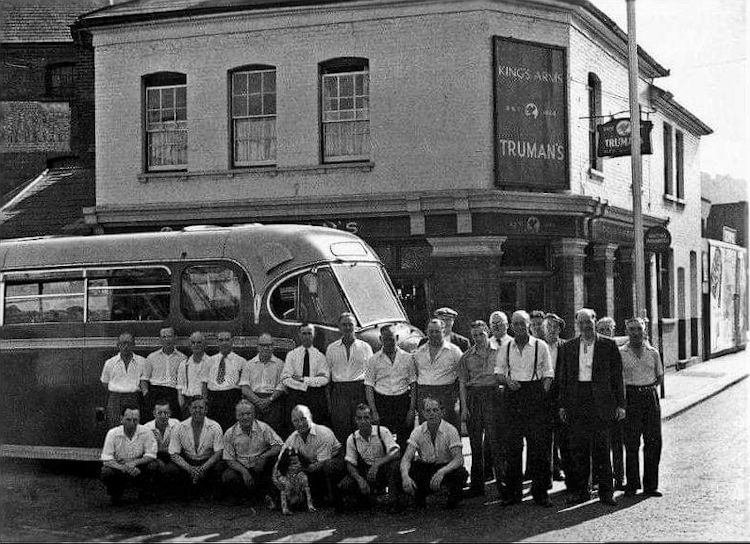
Above photo, date unknown. |

Above photo, date unknown showing licensees Robert and Carol Martin, who
also ran the "Masonic Club" and "Aylesford Club." |
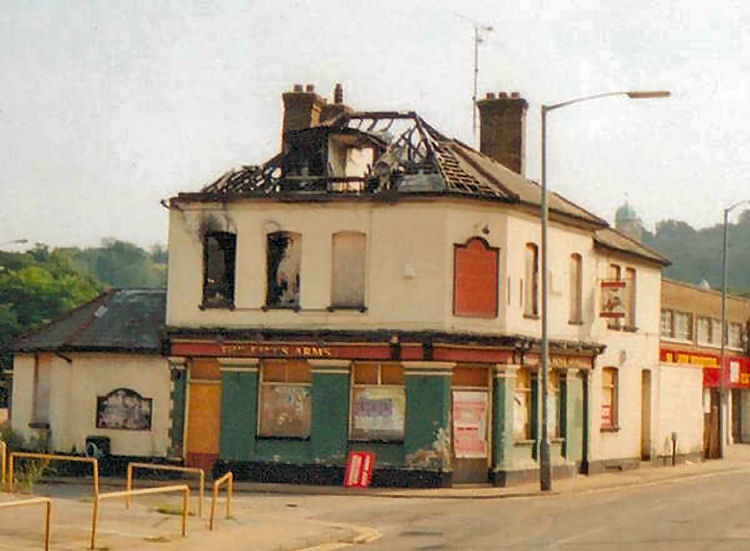
Above photo circa 1990s following the fire. |
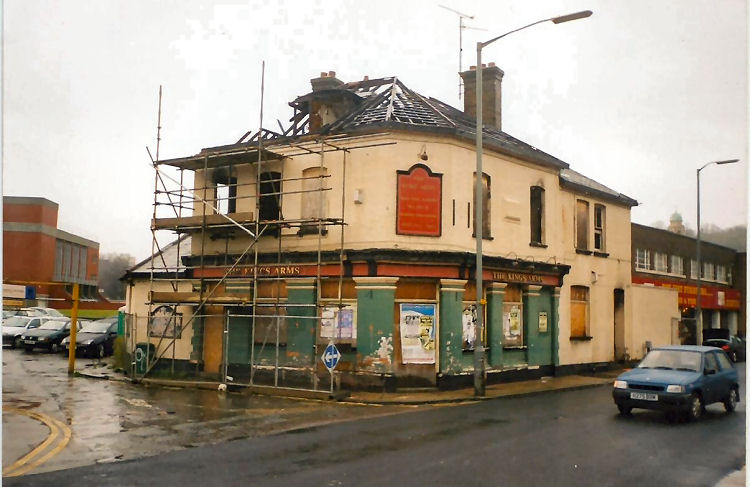
Above pub was demolished in December 2002. |
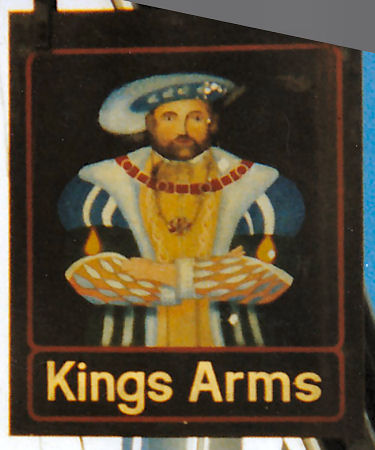 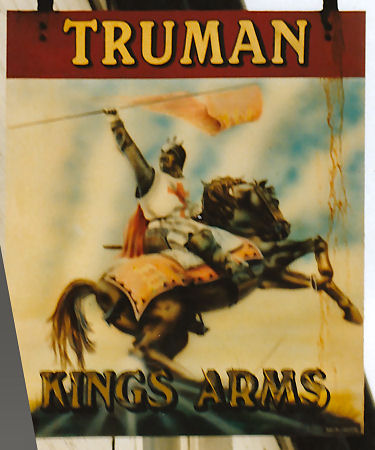
Above sign left, November 1987. Sign right, October 1991.
Thanks from Brian Curtis
www.innsignsociety.com. |
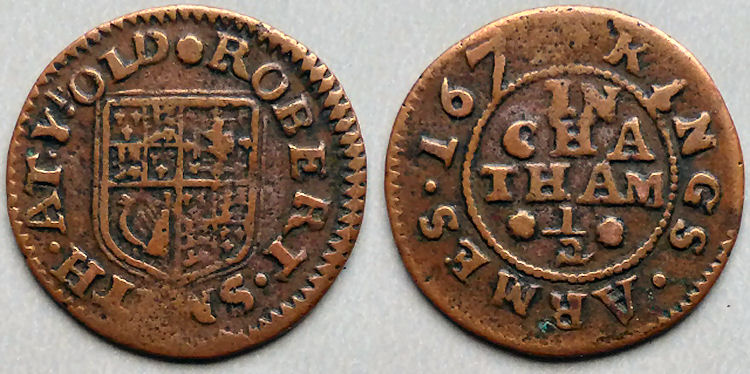
Above token 1671, kindly sent by Mark Reed.
O = ROBERT SMITH AT YE OLDE (KINGS ARMS)
R = KINGS ARMES 1671 (IN CHATHAM ½) |
The Medway Archives and Local Studies Centre has referenced a set of
documents, that I haven't seen yet, and is part of the Watts Charity MSS,
1579-1972.
Reference is made as follows:-
1859-1906
T32. The "Kings Arms," and Holborn Wharf and premises, Holborn Lane [deed
of 1862 includes "King's Head," High
Street and several other messuages. Particulars and conditions of sale,
1906, with plan] (11 docs.)
The 1828, 1864 and 1872 directories gave the address as Holborn Wharf. I
believe it has also been incorrectly referred to as the "King's Head."
The Licensing
Records of 1872 stated that the premises held a Full License and was owned
by the Trustees of Watts Charity in Rochester. It further went to say that
the premises had recently burnt down but that the license was granted for
the adjoining property.
I have traced this back to as early as 1760 from documents held at the
Medway Archives and Local Studies Centre and is part of the Watts Charity
MSS, 1579-1972.
|
Kentish Gazette 8 January 1802.
Saturday last died Mr. Lavender, master of the "Kings Arms"
public house, Holborn Lane, Chatham.
|
|
Kentish Weekly Post or Canterbury Journal 25 June 1819.
Kentish Gazette 25 June 1819.
On Friday morning, Mrs. Filmer, widow of Mr. Filmer, late landlord of
the "King's Arms," public-house, Chatham, put a period to her existence
by swallowing a quantity of arsenic. The deceased had been formerly in
St. Luke's, and has lately been in so desponding a state of mind, that
the Coroner's Jury which was empanelled on the occasion, without
hesitation, gave in a verdict of - Insanity.
|
|
From the Kentish Gazette 22 May 1838.
A Young Man Drowned.
On Wednesday morning, the 16th instant, about four o’clock, a young
man named Thomas Forshaw, a dredgerman, living at Chatham, took a
small boat to go on board his dredging vessel. In the act of
stepping from one boat to the other, he fell into the water and was
drowned. The body was picked up four hours afterwards, and carried
to Benjamin Brady's, of the "King’s Arms," Holborn-wharf. An inquest
was held on the body the following day, and a verdict returned of
Accidentally drowned.
|
|
braddyFrom the Kentish Gazette, 27 October 1840.
DREADFUL ACCIDENT AT CHATHAM. SEVEN LIVES LOST.
On Monday evening a fearful accident happened in the Medway, near
Chatham, by which seven men perished. It appeared that a party of
lumpers, 16 in number, had been at work on board a merchant ship in the
river, and about seven o'clock they all got into a skiff for the purpose
of returning to the shore. It was then blowing a gale from the N.W., and
the water was very rough, while the boat was not at all adapted for a
heavy sea, or to carry to many persons. On nearing a vessel close in
shore, over which the party intended to go for the purpose of stepping
from the ship to the shore, a wave rolled in, and in rebounding from the
ship struck the boat, and the men becoming alarmed all got up and made a
rush to get ashore, but ere one of them could reach the land the boat
capsized and immersed the whole party in the stream. A distressing scene
ensued; the parties clung to each other and begun struggling in the
water, and before any assistance could reach them, seven of them
perished. Some of the survivors managed to swim ashore, and others were
picked up by a fishing boat. Measures were immediately taken to recover
the drowning men, but, owing to the boisterous state of the weather,
without effect. On Tuesday and Wednesday the bodies of six of the
unfortunate men were recovered and taken ashore.
CORONER'S INQUEST.
On Thursday, at 11 o'clock. Mr. Hindo, one of the coroners for the
western division of the county, held an inquest at the "King's Arms,"
Chatham, on the bodies. The names of the misfortunate men are as
follows:- James Hovenden, William Curtis, Charles Genr, William Sower,
William Paine, James Belsom, and Robert Clarke, six of whom have left
widows and a large number of children to deplore their untimely end. A
report having got abroad that the boat from which the unfortunate men
were lost was not capable of conveying with safety the number of
persons, amounting to 16, who had entrusted their lives to it on the
occasion in question, the jury made a most minute inspection in order to
ascertain that fact. It was found, however, that those rumours were
totally unfounded, as the boat was a proper London-built skiff,
measuring 20 feet from stem to stern, and four and a half feet in the
beam, and was at the time in a perfect and seaworthy condition. On the
return of the jury, five men, named Charles Vokes, William Forrester,
William Barr, James Hunter, and David Phillips, who were among the
survivors and had narrowly escaped, were severally called and examined,
but as the depositions were merely a repetition of each other, we shall
only give the substance of them.
It appeared that a person named Rawlinson, who resides in Chatham, and
follows the business of a timber lumper (i.e. a person who contracts for
discharging cargoes of timber,) had sent a number of labourers usually
employed by him for this purpose on the day in question on board the
brig Amy, of Quebec, laden with timber for the use of her Majesty's dock
yard, at Chatham. This brig lay at anchor in the river about 30 or 40
yards westward of the convict-ship, in order to finish the discharge of
the cargo, at which her crew had been employed during the five previous
days. It was usual for Mr. Rawlinson to accompany his men on such
occasions, but having business of a particular nature, which required
his attendance elsewhere, he left the management of the matter to an old
experienced seaman named Phillips, in whose steadiness and caution he
reposed the utmost confidence. The labours of the day having been
concluded at half-past five o’clock, the persons whose names are already
given, together with three whose named Joseph Hitlay, Thomas Perfect,
and William Paine, left the vessel for the purpose of returning to
Holborn-wharf, Chatham, about a mile and a half distant from the
dock-yard on the same shore. At this time the wind blew a gale from the
north, which rendered it necessary for the persons in the boat to row
across towards the weather shore, as, on account of the swell, it was
impossible to proceed in a direct line with safety. They succeeded in
crossing close to the sheer-hulk, and got onwards upwards of a mile
under the weather shore, until nearly opposite Holborn-wharf. They then
attempted to cross, but when they got into the broken water, within
about 20 yards of the desired point, the boat shipped a heavy surf and
almost immediately filled. For some time before considerable alarm
prevailed amongst the crew, many of whom were altogether inexperienced
in nautical matters, but at this critical period the majority lost all
self possession, and several of them rose with the intention of
precipitating themselves into the water, and trusting to chance for
safety. Phillips, who was looked to as the most experienced and
cool-headed amongst them addressed them in a brief and hurried manner,
telling them that they must look out and not cling to each other, but
each endeavour to save himself. Whilst he was speaking three or four of
the most daring jumped from the head of the boat—an example which
Phillips himself immediately followed; and almost at the same moment,
whether from the effect of the rebound or from some other cause, which
cannot be correctly ascertained, the boat upset keel upper most. The
scene at this moment, as described by all, was truly awful, but the
account given by Perfect, who was himself insensible for several hours,
and was resuscitated with much difficulty, is perhaps the most vivid. He
stated, that after they had been thrown out, he was cast by accident
against the boat again, and immediately seized the keel. Almost
simultaneously with this effort he felt one of his legs grasped by
Belsom, who clung to him with the utmost tenacity, and just as both were
about to sink together a receding wave from the shore struck the
unfortunate man and carried him into the surge. Perfect, although nearly
exhausted, summoned his remaining strength, and with great exertion
succeeded in regaining the keel. In an instant a brave little fellow, a
mere boy, named Eves, cast a rope, the end of which Perfect luckily
caught, and by this means was dragged to the shore, but in a state of
utter insensibility. Whilst the lad Evre, assisted by several spectators
(crowds of whom had by this time reached the shore), was drawing Perfect
to land, the bodies of three others were thrown up within reach by the
waves. All hands were in immediate requisition to render every assistance
within human power; and whilst the bodies were being removed by some to
the parlour of the "King's Arms Tavern," which was almost at hand, and
in which a good fire was already blazing, others were despatched in
quest of surgeons, seven or eight of whom made their appearance in
nearly as many minutes. Every method of resuscitation recommended and
adopted by the Humane Society was instantaneously employed by Drs.
Bryent, Marlin, Robinson, Tride, and others, whose names our reporter
was unable to collect; but, although it was said that Clarke and James
showed evident signs of animation after being placed on the floor, yet,
with the exception of the case of Perfect already mentioned, the utmost
efforts to recover the sufferers were unattended with success.
The usual expedients of applying hot flannels and inflating the lungs
were tried, long after the period when such applications might be
pronounced hopeless, as the medical man were anxious that nothing which
science or ingenuity could suggest should be left unemployed. In the
case of Perfect, hot bricks to the soles of the feet were tried; but
whether his restoration was attributed to that circumstances or not,
were not clearly ascertained. It is likely, however, they they were only
useful in his case in consequence of the aid so timely afforded him.
Two of the persons whose bodies were washed on shore at the period
alluded to were those of men who had been in the marines service for a
greet number of years. One, named Gear, had been a sergeant in the
Marine Artillery for 28 years. As a great deal of the responsibility
rested upon Phillips, in consequence of his master having placed him in
charge of the boat and men, he was examined at great length. His
evidence, however, which was given in a clear and explicit manner, went
merely to show that on many previous occasions he had gone in the same
boat with 20 persons, and that therefore it was a perfectly safe
conveyance for the number it contained on the occasion in question. He
stated, that he had used all the skill and knowledge he possessed, but
that no human power could have averted the calamity; at the same time,
he believed that if Belsom, who was the first who jumped from the boat,
had retained his seat, they might have got safe to shore.
The coroner having summed up the evidence, the jury, after a short
deliberation, returned a verdict of "Accidental Death." They afterwards
desired Mr. Rawlinson to be brought before them, when they assured him
that not the slightest blame attached to him in consequence of the
melancholy event they had to investigate.
|
|
Kentish Gazette 3 November 1840.
DEATHS.
October 23, Mr. Benjamin Braddy, landlord of the "King's Head"
sic. public house,
Holborn Wharf, Chatham, to which the bodies of the unfortunate men who
were lately drowned were taken. Mr. Braddy had for some time been in bad
health, but his end was accelerated by that melancholy catastrophe. |
|
Kentish Gazette, 2 January 1844.
The Rival Coroners. A Double Inquest.
On Friday morning last a man named Patrick Knowlan, a private in the 3rd
buffs, was
discovered lying dead close beneath the platform of a wharf at the
bottom of Holborn-lane, Chatham. It would appear that deceased had mistaken his way and
fallen from the
wharf which is used for landing coals from the river, a depth of about
eight feet, upon
the muddy beach below, which was then strewn with refuse coal. There was
a large and
severe wound upon the left temple, and a piece of coal was sticking in
the left cheek
close below the eye. The whole left side of the face was much contused.
He had
evidently, from the state of his clothes, been covered with water, which
overflows this
spot at the period of spring-tides. Although nothing certain is known,
it is generally
supposed that he took Holborn-lane for the West-lane which leads to the
barracks, and
that walking forward in the darkness he fell from the wharf.
Mr. Lewis, the coroner for the city of Rochester, claims jurisdiction
over all bodies found
in the water at this spot, and as the unfortunate man had evidently been
immersed, he
thought this a proper case for the exercise of his office, and
accordingly summoned a
jury to sit upon the body at 10 o'clock on Friday morning; but on his
going to view the
deceased he found that it was at the "King’s Arms," Chatham, in the
hands of Bines, the
Chatham constable, as the representative of Mr. Hinde, one of the
coroners for the
eastern division of the county of Kent, who refused to give up the key
of the room, but
allowed Mr. Lewis and his jury to view the body. They then returned to
the "Nag’s
Head," Rochester, and having heard the evidence of John Shepherd, a
fisherman, who
deposed that a carter going on to the beach for coals at half-past seven
on Friday
morning found the body as already described, the jury returned a verdict
of "Found
Dead."
Mr. Himle, the county coroner, held another inquest upon the deceased at
the "King’s
Arms," and after taking the evidence of William Wittingham, the carter,
who found the
body, and Frederick Collins, a corporal of the 3rd buffs, who stated
that he saw the
deceased on the evening preceding his death, and he was then sober, the
jury returned
a verdict of "Accidental Death." Each of the coroners issued a warrant
for the interment
of the body. The disputed jurisdiction, it is believed, will now be
submitted to the
decision of a higher court, in order to settle what is here considered a
"vexata questio." (Overrun problem.)
|
|
South Eastern Gazette, 17 April, 1860.
Friday. (Before the Rev. G. Davies and Capt. Savage).
Ann Sands aid Eliza Knowland were charged with stealing a silver
watch from the person of Thomas Brooker, at the "Kings’ Arms"
public-house, Holborn-lane.
Prosecutor, a simple-minded countryman, said he was drinking in the
tap-room of the "King's Arms" on Saturday night, when Knowland spoke
to him and pushed up against him. The other prisoner was also there.
Prosecutor remained there about five minutes, and on leaving the
house missed his watch, which was worth £2 10s.
Lydia Smith, the landlady of the "King’s Arms," stated that on
making enquiries she found that the watch had been pawned by the
prisoner Sands the same evening.
Police-constable 86 apprehended the prisoners on the charge, when
Sands admitted that she had pledged the watch for a half-crown.
Mr. Willis, pawnbroker, Eastgate, said the watch was pledged by the
prisoner Sands on Saturday evening, the same night as the robbery.
In reply to the usual questions she said it belonged to her deceased
husband; she gave a false address.
The prisoners were both committed for trial.
|
|
South Eastern Gazette, 10 July, 1860.
Eliza Noland and Ann Sands, for stealing a watch and appendages,
value 30s., from the person of Thomas Brooker on the 7th April.
Noland pleaded guilty. Mr. Harrow was for the prosecution, and Mr.
Ribton defended the prisoner Sands.
The watch, it appeared, was stolen by Noland from the prosecutor, at
the "King’s Arms" Chatham and was pledged by Sands.
Noland, six months hard labour; Sands (guilty of receiving, but
recommended to mercy on account of her family), three months' hard
labour.
There was another indictment against both prisoners, which was not
proceeded with.
|
|
South Eastern Gazette, 24 July, 1860.
Suicide of an Old Man.
On Friday last an inquest was held at the "King’s Arms," Chatham,
before T. Hills, Esq., the coroner, on the body of John Field, aged
70 years, who committed suicide the previous day by drowning himself
in the Medway.
From the evidence of the witnesses examined it appeared that the
deceased, who passed by the nickname of "God save the Queen," was
seen for several days sitting by the side of the river at ths
New-stairs, and on Thursday morning deliberately walked, into the
river, wishing some boys who were there "Good bye."
Deceased almost immediately sank, and on the body being recovered
soon afterwards, life was quite extinct. The deceased, who had been
in the Medway Union some time, discharged himself about a fortnight
since. He had tried to get work, but was unable to obtain any, and
this appeared to have preyed on his mind, and he had frequently
declared that he would rather do anything than go back to the union.
The jury returned a verdict that deceased destroyed himself in a fit
of "Temporary insanity."
|
|
South Eastern Gazette, 30 October, 1860.
Robbery of 200 Sovereigns.
On Wednesday last Charles Castles, a private in the Chatham division
of Royal Marine Light Infantry, was charged before the magistrates
at Rochester, with being concerned, with two other men not in
custody, with stealing 200 sovereigns and some other money belonging
to Mr. Thos. Greenslade, landlord of the "White Hart" public-house,
Brook, Chatham. The robbery was effected about a fortnight since,
and the prisoner immediately afterwards deserted. The prisoner,
together with several other marines and troops of the line, were
drinking in prosecutor’s house on the afternoon and evening of the
night of the robbery; the cash-box, which contained upwards of £200
in gold, a few pounds’ worth of silver, bank notes, and some
documents, being at the time on the drawers in an upstair bed-room.
During the evening a row was got up between the men drinking in the
tap-room, and it was then that the robbery was effected, prosecutor
being engaged some time in quelling the disturbance. At about twelve
o’clock that night the cash-box was found to have been broken open,
and on being examined it was discovered that upwards of 200
sovereigns had been abstracted, together with some silver; about £55
bad been left behind. Some time before the robbery the prisoner
slept in the house, and on the landlord going upstairs he found him
in his bed-room, when prisoner apologised by saying he thought he
heard one of his comrades calling him. A night or two after the
robbery had been effected, a soldier of the 30th Regt., named
Lawrence, entered the Marine barracks and asked for the prisoner, at
the same time producing about 70 sovereigns, stating that prisoner
and a man named Simpson had a similar amount. On the same evening
prisoner and Lawrence were at the "King’s Arms" public-house,
Holborn-wharf, where they were conversing about the robbery.
Lawrence was heard to say prisoner had arranged the robbery four
days before it took place, and that when everything had been
prepared prisoner and himself got into the room through the window
and carried off £207. A marine named Simpson was "in" the robbery,
and had his share. Both Lawrence and Simpson had deserted and had
not yet been apprehended. The prisoner also deserted after the
robbery, but was apprehended by a city police-constable, when he
denied all knowledge of Lawrence, and likewise denied ever having
been at the "White Hart" public-house. On crossing Rochester-bridge
on his way to the station-house the prisoner was observed to take
something from his pocket and throw over the bridge into the river.
A few days after a boy named Colley, residing in John-street,
happened to be searching among the mud in the river, when he picked
up a purse containing 44 sovereigns and a half, which was no doubt
what the prisoner had been seen to thrown over the parapet. The
prisoner was fully committed for trial.
|
|
South Eastern Gazette, 11 December, 1860.
Committal of a Publican for Fowl Stealing.
On Friday last the county magistrates were engaged some time at the
justice-room in the investigation of a charge of stealing fowls,
preferred against Mr. John Smith, landlord of the "King’s Arms"
public-house, Holborn-wharf, High-street, Chatham, who was brought
up in the custody of Superintendent Everist, of the Chatham police
force. Mr. Stephenson defended the accused. From the evidence given
in support of the charge it appeared that the poultry house of Mr.
J. West, Strood, was broken into on the night of the previous
Monday, and five ducks and the same number of fowls stolen.
Information was immediately given to the police, when, from private
information received by Supt. Radley, that officer proceeded in
company with Supt. Everist to the prisoner’s public-house, where, in
some premises at the back, they found the five ducks and four fowls
hanging up, one of the fowls having been cooked on the previous day.
The prosecutor was enabled to identify both the fowls and the ducks
by some peculiar marks about them. The explanation given by the
accused, as to how he become possessed of the stolen property, was,
that he had purchased a quantity of poultry of a man, the fowls and
ducks stolen being among the number, giving him 18s. for eighteen.
The Rev. Mr. Davies, the presiding magistrate, told the prisoner he
should like him to buy some for him at that price, if they could be
honestly obtained, and committed the accused for trial, consenting
to take bail, which was at once put in.
|
|
From the Southeastern Gazette, 20 February 1866
Death by Drowning.
An inquest was held at the “King’s Arms Tavern,”
River-row, on Wednesday last, before T. Hills, Esq., coroner, on the
body of William Henry White, aged 42, who was accidentally drowned
whilst at his work in Chatham dockyard. The deceased was employed with a
number of other men near the boathouse, and was assisting in letting a
barge out of the boat-house-pound. While doing so he slipped from the
floating boom on which he was standing into the river. Assistance being
at hand he was got out almost instantly, and was then alive, but he died
almost immediately afterwards.
Dr. Rickards, assistant-surgeon at Chatham dockyard
said he went to the deceased immediately he was sent for and adopted the
usual means to restore animation, but without effect. From the
peculiarity of the case he was of opinion that the deceased, who was a
man of weakly constitution, had been seized with some kind of a fit.
The jury returned a verdict of “Accidental death.”
|
|
From the Southeastern Gazette, 27 March 1866.
Fatal Accident.
An inquest was held at the “King’s Arms Tavern,” River-row, before T.
Hills, Esq., coroner, on the body of Henry Baker, aged 50, who met with
his death though an accident which he sustained in Chatham dockyard, on
the previous day. The deceased, who was employed in the department of
works, under Mr. Rivers, was occupied, with other men, in taking down
the staging erected at the head of No. 7 ship, to raise the travellers
for conveying the armour plates, which are ordered to be stored at that
part of the yard. While so employed he lost his footing, and was
precipitated to the dock, sustaining a severe fracture of the skull. He
was immediately convoyed to the hospital, but he died within a short
time after his admission. Verdict, “Accidental death.”
|
|
From the Southeastern Gazette, 31 July 1866.
Fatal Accident.
An inquest was held on Tuesday last, at the “King’s Arms Tavern,”
River-row, before T. Hills, Esq., coroner, on view of the body of George
Kimber, aged 34, who met with his death under the following
circumstances.
The deceased, who was in the employ of Mr. Bullbrook, brickmaker,
Gillingham, was driving a cart laden with bricks from Gillingham to
Chatham. On the incline near St. Mary’s church, a short distance above
the drawbridge crossing the trenches, the deceased, who had been seated
in the cart, was observed in the act of rolling off the top of the straw
which covered the bricks, and hanging on by his right arm over the
shaft. He appeared to be endeavouring to recover himself, but failed in
doing so, and fell to the ground, one of the wheels passing over the
right side of his chest. The deceased was immediately picked up by a
sailor, named Moore, who witnessed the accident, and placed in a cart
belonging to Mr. Rook, in which he was conveyed to Melville hospital,
where he was examined by Dr. Weekes, of Brompton, when it was found that
the ribs of his right side were completely crushed in. After remaining a
short time in an insensible state the deceased expired from the effects
of the injuries.
Verdict “Accidental death.”
|
|
From the Rochester and Chatham Journal and Mid-Kent Advertiser,
Saturday, September 2, 1876.
Miscellaneous.
The magistrates hear adjourned for some time to take of luncheon. On
business being resumed the following persons, who had been convicted of
various offences during the year, and his cases had been deferred in
consequence, apply for the renewal of their licences. vis. Thomas Cameron, "Kings
Arms," Chatham....
The other licences were renewed after the holders had been cautioned.
|
After a fire in the 1990s the pub remained a ruin till it was eventually
demolished in 2002. I am informed that the site has not yet (2017) been
built upon.
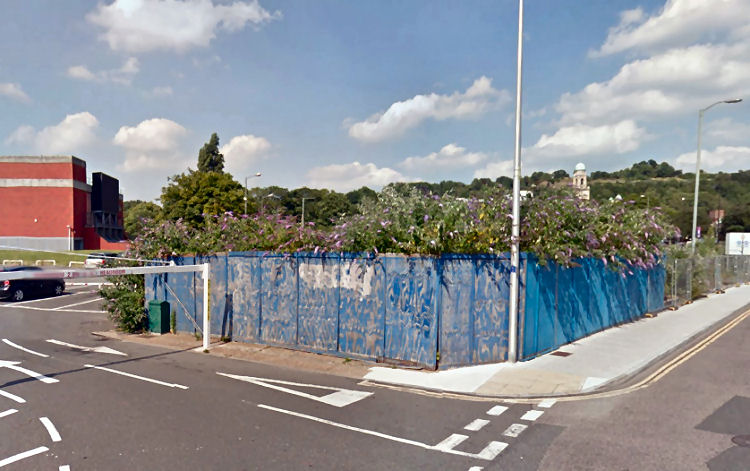
Above Google image 2016. |
LICENSEE LIST
WILLS/WELLS Robert 1791-93+

LAVENDER Mr to Jan/1802 dec'd
FILMER Mr pre 1818
SHIPMAN Edmund 1828+

LITLEY William George 1832+
 (Holbourn Wharf)
(Holbourn Wharf)
BRADY Benjamin dec'd 1838-Nov/1840
ALLEN John 1851+ (age 55 in 1851 ) )
MARSHMENT Thomas 1858+
SMITH Lydia 1860+
SMITH John 1860+
CAMERON Thomas 1862-74+
(age 60 in 1871 ) )

BALLARD John 1881-91+ (age 47 in 1881 ) )
BARNARD Daniel Hardy 1901-03+ (age 41 in 1901 ) )

FOREMAN George Edwin 1911-13+ (also Police Pensioner age 49 in 1911 ) )
FOREMAN Elizabeth Mrs -1922-30+
HATTERSLEY Charles 1938+
PUNTER William J A 1950-55+
 WILLIAMSON James & Winifred 1960s
WILLIAMSON James & Winifred 1960s
 WILDING William D 1972-73 dec'd
WILDING William D 1972-73 dec'd
MARTIN Robert & Carol ????
https://pubwiki.co.uk/KingsArms.shtml
http://www.closedpubs.co.uk/kingsarms.html
 Universal
British Directory of Trade 1793 Universal
British Directory of Trade 1793
 From the Pigot's Directory 1828-29 From the Pigot's Directory 1828-29
 From the Pigot's Directory 1832-33-34 From the Pigot's Directory 1832-33-34
 From the Kelly's Directory 1903 From the Kelly's Directory 1903
 Licensing
Records 1872 Licensing
Records 1872
 Census Census
|







